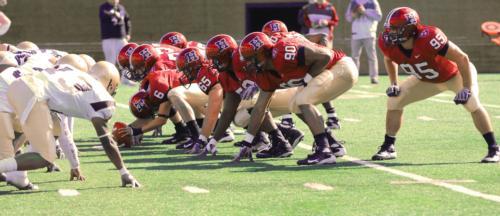
News
Harvard Quietly Resolves Anti-Palestinian Discrimination Complaint With Ed. Department

News
Following Dining Hall Crowds, Harvard College Won’t Say Whether It Tracked Wintersession Move-Ins

News
Harvard Outsources Program to Identify Descendants of Those Enslaved by University Affiliates, Lays Off Internal Staff

News
Harvard Medical School Cancels Class Session With Gazan Patients, Calling It One-Sided

News
Garber Privately Tells Faculty That Harvard Must Rethink Messaging After GOP Victory
Harvard Showcases Einsteins of the Gridiron

Between rigorous concentration requirements and highly demanding classes, balancing the general demands placed onto a Harvard student can prove to be a daunting task. Add morning lift, afternoon practice, film review and weekly games to the mix, and one starts to wonder whether there is enough time to eat three meals a day and still get more than four hours of sleep.
Throw in a three-hour lab and time-gobbling problem sets on top of all of this, and time to breathe becomes questionable.
Harvard athletes in science, although existent, are a relative rarity. When looking at declared juniors and seniors, the football team has only five athletes combined in the sciences concentrations, which number over a dozen. In comparison, there are t23 members of their ranks in economics alone.
Other varsity sports teams follow this trend as well. Both men’s and women’s basketball lack a single science concentrator, while the softball team contains only one athlete in a science-based derivative—the social and cognitive neurosciences track of the psychology department.
Considering the burdens, such as lab hours and less-flexible requirements, which a science concentration places on an already tight schedule, the shortage of athletes in these majors comes as no surprise.
“A lot of people would rather do Ec[onomics] or Gov[ernment] because traditionally they have less requirements and less hard math in them,” said senior football tight end Jason Miller, who is concentrating in Engineering Sciences. “There’s not another engineer on the football team and that’s probably one of the major reasons, because it’s hard to put it all together.”
One of the major hurdles athletes in science concentrations must overcome is assembling a coherent schedule, especially due to the sequenced nature of science and pre-med classes. Unlike more flexible majors where there are few prerequisites to concentration classes, science majors generally have a set track of what needs to be taken at a specified time in one’s schedule. For example, Physical Sciences 1 is recommended before Chemistry 20 can be taken, which is required for Chemistry 30—if one of these does not fit into an already strained timetable, an individual’s schedule may be thrown off by an entire year.
To compensate for these struggles in scheduling, many athletes in the sciences resort to taking summer classes to free up time during the school year. Miller has utilized this strategy to lighten his engineering course load during season; senior hockey forward and co-captain Kirsten Kester has as well, to make space for her Molecular and Cellular Biology requirement of Organic Chemistry.
“[Organic Chemistry] has a long lab hour and tends to meet in the afternoon for lecture which is hard to fit in with my schedule,” Kester said. “That’s the only one that would have been a conflict for me, but I was able to work around it.”
Another scheduling obstacle for athletes is the managing of labs around practice times. Although demanding, given the fact that most varsity teams get one day off during the week and most science classes offer night labs, this difficulty can be overcome.
“There’s always a huge dilemma trying to schedule [labs], said women's basketball co-captain Niki Finelli, a Psychology concentrator also pursing a pre-medical track. “I can’t remember a time when there wasn’t an overlap—I always had to negotiate with my coach.”
Miller echoed this sentiment.
“Your stars almost have to align for your schedule to work out,” Miller added.
However, most Crimson athletes in science would not trade the extra hindrances they encounter for a more flexible, but different course of study. Whether pursuing a career in medicine and the sciences, or a simple passion for the subject matter, these athletes are willing to endure various time strains to accomplish their goals.
Junior linebacker Conor Murphy, who concentrates in Human Evolutionary Biology, takes an optimistic approach to these dilemmas.
“In terms of worrying about my schedule and if I’ll have enough time to take the right classes, my philosophy is just get it done any way possible,” Murphy said. “I always focus on being a college football player, being a doctor, and my faith as well—I make sure I always get those three done before anything else.”
In spite of the added pressures of collegiate athletics and scientific pursuits, these Harvard athletes have been able to endure the difficulties thrown their way, and look back upon their college careers with satisfaction.
“It’s really been a great ride—I’ve enjoyed every second of it,” Finelli said.
Kester agreed, adding that given the chance to repeat her four years, she would not make any changes.
“I would have felt like I missed out if I didn’t major in a science because it’s where my passion was,” Kester said. “As a senior, I’m very happy looking back and I’m ready to move forward.”
—Staff writer Alexandra J. Mihalek can be reached at amihalek@fas.harvard.edu.
Want to keep up with breaking news? Subscribe to our email newsletter.
